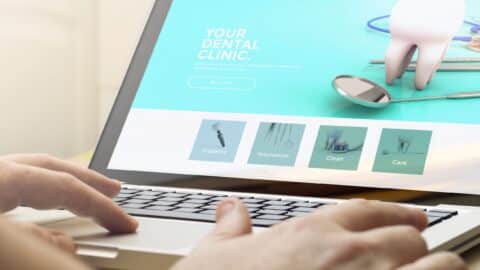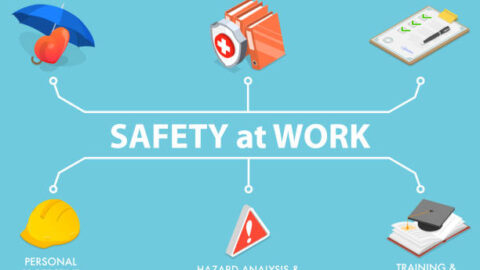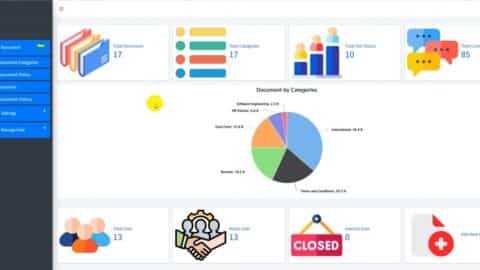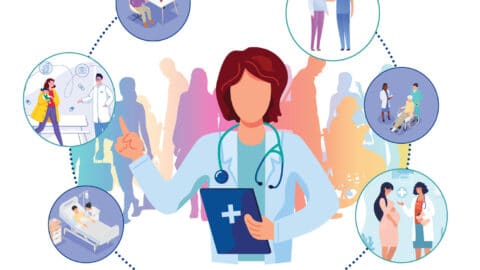Collaboration and Knowledge Sharing in Healthcare Training: Tools and Techniques for Success
The Importance of Collaboration and Knowledge Sharing in Healthcare Training
The healthcare industry is constantly evolving, and healthcare professionals need to keep their knowledge and skills up-to-date to provide the best care for their patients. That’s why investing in employee training and development is crucial for healthcare organizations. In this article, we’ll explore the benefits of employee training and development in the healthcare industry and how it can lead to improved patient outcomes, increased employee satisfaction, and better overall organizational performance. We’ll also discuss how to measure the effectiveness of training programs and share tips on how to overcome common challenges in healthcare training. Join us as we delve into the world of healthcare training and development and Collaboration and knowledge sharing.
Table of Contents
The Challenges of Healthcare Training: Why Collaboration and Knowledge Sharing Matter
The healthcare industry is constantly evolving, and with it comes the need for healthcare professionals to receive ongoing training and development. However, healthcare training can be a challenging endeavor, and there are many obstacles that healthcare organizations face when it comes to training their workforce:
- The rapid pace of change in the healthcare industry is a major challenge for training healthcare professionals, as they need to be trained to keep up with new technologies, procedures, and regulations.
- The shortage of healthcare professionals is another challenge that can make it difficult to provide training and development opportunities for existing employees.
- Healthcare training can be expensive and time-consuming. This can further exacerbate the challenges of providing adequate training for healthcare professionals.
- Despite these challenges, collaboration and knowledge sharing can be powerful tools in overcoming them. By fostering a culture of collaboration and knowledge sharing, healthcare organizations can leverage the expertise of their employees to develop effective training programs. This can lead to more efficient and effective training, as well as improved outcomes for patients.
In the following sections, we will explore some of the ways that healthcare organizations can promote collaboration and knowledge sharing in their training programs, and the benefits that can result from doing so.
Tools for Collaboration and Knowledge Sharing in Healthcare Training
In today’s digital age, there are many tools available to healthcare organizations to facilitate collaboration and knowledge sharing in their training programs. These tools can help healthcare professionals to access and share information quickly and efficiently, regardless of their location. Some of the most commonly used tools for collaboration and knowledge sharing in healthcare training include:
Learning Management Systems (LMS)
A Learning Management System (LMS) is a software platform that allows healthcare organizations to manage and deliver their training programs. An LMS provides a centralized location for storing training materials, tracking employee progress, and administering assessments. LMSs also offer features such as forums, wikis, and social learning. This can facilitate collaboration and knowledge sharing among healthcare professionals. By using an LMS, healthcare organizations can ensure that their employees have access to up-to-date training materials and can track their progress in real-time.
Online Collaboration Tools
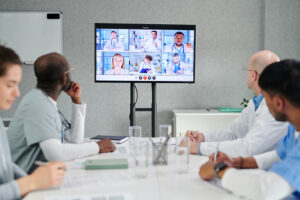
Online collaboration tools such as Slack, Microsoft Teams, and Google Workspace provide a platform for healthcare professionals to collaborate in real-time. These tools allow healthcare professionals to communicate with each other, share files, and work on projects together. Online collaboration tools can be particularly useful for healthcare organizations with employees located in different geographic locations. As they allow for seamless communication and collaboration across teams.
Social Learning Platforms
Social learning platforms are online communities that allow healthcare professionals to connect, share knowledge, and collaborate with each other. These platforms, such as Doximity and Figure 1, offer features such as discussion forums, file sharing, and peer-to-peer learning. Social learning platforms can be a powerful tool for healthcare organizations to encourage collaboration and knowledge sharing among their employees.
Overall, the use of these tools can significantly enhance the effectiveness of healthcare programs by promoting collaboration and knowledge sharing among healthcare professionals. By leveraging these tools, healthcare organizations can ensure that their employees are well-trained and equipped to provide high-quality care to patients.
Techniques for Effective Collaboration and Knowledge Sharing in Healthcare Training.
Effective collaboration and knowledge sharing in healthcare training can be achieved through various techniques. In this section, we will discuss some of the most effective techniques. So healthcare organizations can use to facilitate collaboration and knowledge sharing in their training programs.
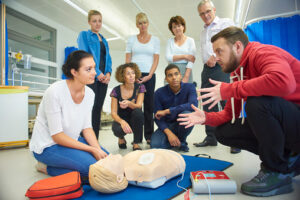
Communities of Practice
Communities of practice are groups of individuals who share a common interest or passion and work together to deepen their knowledge and expertise in that area. Healthcare organizations can create communities of practice around specific clinical topics. Hence allowing healthcare professionals to share best practices, exchange ideas, and learn from one another.
Peer-to-Peer Mentoring
Peer-to-peer mentoring involves pairing experienced healthcare professionals with less experienced ones to facilitate knowledge transfer. This can be done through formal mentoring programs or informally through the establishment of mentor-mentee relationships. By pairing experienced healthcare professionals with less experienced ones, healthcare organizations can ensure that knowledge and expertise are transferred efficiently.
Learning Circles
Learning circles are small groups of healthcare professionals who come together regularly to learn from one another. But learning circles can be formed around specific topics or areas of interest. And they can provide a collaborative environment for healthcare professionals to learn from one another and share best practices.
By incorporating these techniques into their programs, healthcare organizations can create a collaborative learning environment that promotes knowledge sharing and facilitates effective learning.
Best Practices for Successful Collaboration and Knowledge Sharing in Healthcare Training:
Creating a Collaborative Culture
To foster collaboration and knowledge sharing, healthcare organizations need to create a culture that supports these practices. This can be done by encouraging open communication, promoting teamwork, and recognizing and rewarding collaboration.
Providing Incentives for Collaboration and Knowledge Sharing
Healthcare organizations can provide incentives for collaboration and knowledge sharing by offering recognition programs, bonuses, or promotions based on collaborative achievements. This can help to motivate employees to work together and share their knowledge and expertise.
Encouraging Continuous Learning and Development
Healthcare organizations should encourage their employees to engage in continuous learning and development. This can be offering training opportunities. And creating a learning environment that supports exploration and experimentation, and providing resources for ongoing development. By supporting continuous learning, healthcare organizations can ensure that their employees have the knowledge and skills.
Conclusion
Collaboration and knowledge sharing play a crucial role in improving it. By utilizing various tools and techniques, healthcare organizations can create a culture of collaboration that promotes effective training and development. Providing incentives and encouraging continuous learning can further enhance collaboration and knowledge sharing among healthcare professionals. Ultimately, by investing in collaboration and knowledge sharing, healthcare organizations can ensure that their employees have the skills and knowledge. So they provide high-quality care to their patients.

Business Developmeny Manager at PAS InfoCom Technologies Ltd. Experienced in project management with a demonstrated history of working in the information technology and services industry.


